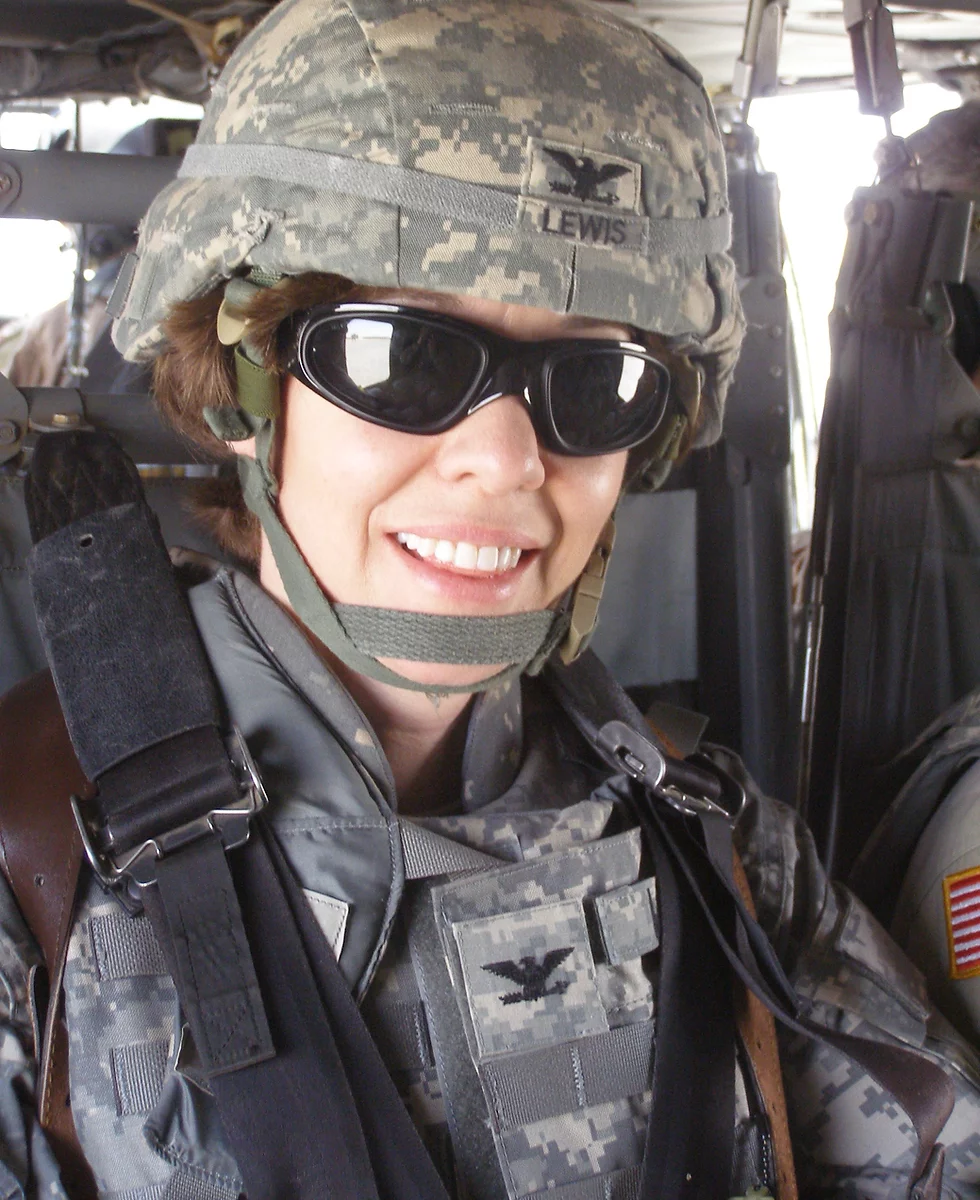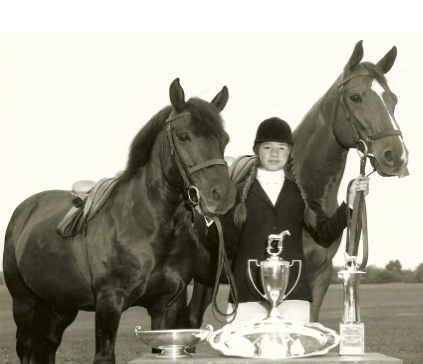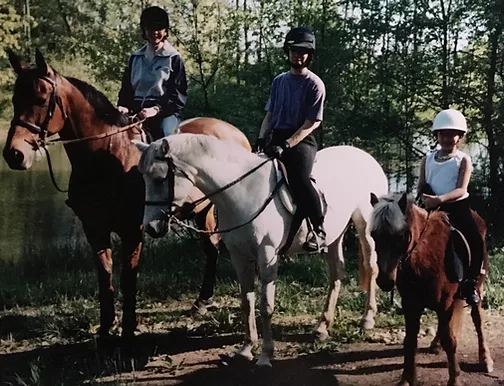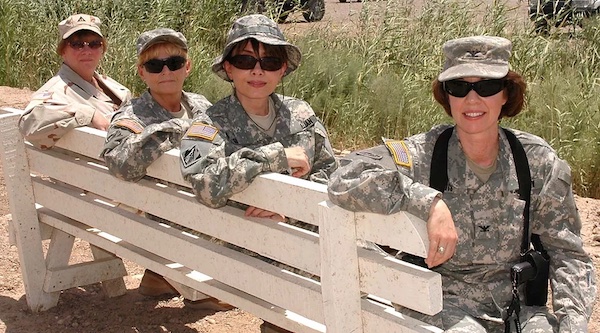








By Sarah Hodges
Colonel Debra M. Lewis’s 34-year military career continually brought her face-to-face with high-stress situations. From her first days in the Military Academy to her deployments in Iraq, Deb focused on how “stay on her feet”, and if she got knocked down, how to “get back up” as quickly as possible… no matter how demanding a situation was.
Deb’s parents taught her that she could do anything she set her mind to. She followed in her father’s footsteps and joined the United States Military Academy at West Point. She continued on to embrace a successful military career in which she served as an engineer, participating in critical, high-risk tasks such as reconstructing city infrastructure in Iraq, and working in the Pentagon as their Antiterrorism Engineer Advisor during 9/11.
After reading an article about Deb in Hawai’i’s MidWeek magazine, Renée Tillotson introduced Deb to the Still & Moving Center. Deb presented a talk entitled “On the Battlefield of Life” at Gems from the Wisdom Traditions conversation circle. She shared her experiences of thriving through stress. This skill isn’t something we’re born with but something to be learned. Now that she’s retired from the Army, Deb founded her business – Mentally Tough Women. Through it, she devotes her energy to teaching people the invaluable skill of becoming “emotionally and physically stronger”.
Through her military training, Deb acquired her emotional strength the hard way, gathering up tokens of insight through blunder and blows. Her disciplined engineer mindset led her to focus on the path ahead – on the goal, not on the obstacle. This skill transcends the military context and allows her to face any situation that might come. Within her Mentally Tough Women programs, Deb provides comprehensive guidance, sharing this important toolbox with others facing extreme or ongoing, unhealthy stress of any kind.
As a young cadet in the very first women’s class at the United States Military Academy at West Point, Deb immediately faced demanding circumstances. On her very first day there, she and many of the other women discovered their trousers had been sewn to match the men’s uniforms, but with one problematic difference. Tailors used color-coordinated nylon rather than heavy-duty metal zippers for the women’s trousers. They were not strong enough to hold the thick fabric of the pants. As cadets, they were only allowed only to speak 4 phrases: “Yes, sir.” “No, sir.” “ No excuse, sir.” and “Sir, I do not understand.” Deb and the many other women with failing zippers faced a stressful decision: should they break the rules and say something to take care of their broken zippers, or embarrass themselves and everyone else given the high risk their pants would fall down in the upcoming ceremony in front of 1000s of people?
In that stress-filled moment, Deb developed a self-guidance system to get through dilemmas: look at the goal, not at the obstacles. Her goal to become a proud representative of the US Military, fully clothed in uniform, trumped the punishment she accepted for speaking out of turn.
After surviving Day One of her training at West Point, she experienced another revelatory moment in the challenge of Day Two. Although she was skilled in horseback riding and swimming, she was no runner. In order to prepare for the Academy, she trained to run 1.5 miles. For the first female class at West Point, the pressure was high. Deb was determined to prove that women should be at the Academy because their physical fitness was equal to the task for military service. When commanded to run 2 miles on the second day of training, Deb hit a mental wall. “A mile and a half felt like my limit,” says Deb. “Running in formation made things even more challenging, with space and stride issues.” “The military pushed me past my extreme limits,” recounts Deb.
Deb felt ready to stop, giving in to all the discomfort surging through her body. In that moment she made a pact with herself: “I will pass out before I fall out.” And it worked for her in that case. She completed the run!
“I focused, as we all can do in life during hardship, on the direction I wanted to go and taking the next step. It helped me go beyond my physical capacity. I learned that Stress is my Superpower. Under stress, I discovered we have abilities we never thought we had.”
Deb explains, “I try to make stress a friend not a foe. It’s essential to accomplishing whatever it is we want in life. In Iraq, I was responsible for coordinating with locals to create more stable systems and infrastructure. Despite the nearby sounds of bombing and mortar fights, I put my faith in those who were given the job of protecting me. As long as they maintained their calm, I trusted their ability to protect me so I could carry out my duty.”
Every place she was sent on a mission was filled with risk. She had to move with awareness, being careful to avoid snipers, mortars, IEDs, or being kidnapped. Despite the danger, she had a mindset that she could accomplish even the toughest task in the midst of potential harm.
Deb’s ability to give her heart to her mission also helped clear out any mental resistance or inner conflict. That held her steady. One time, a young family man who had driven her by military jeep to her job site, was blown up and killed shortly after dropping Deb off. Can we imagine Deb’s stress in such a situation? Yes.
Nevertheless, with a clear mind and steady heart devoted to her mission, Deb was able to navigate external conflict while maintaining internal composure. She now teaches mental toughness skills to people dealing with any kind of life stressors, not only those in combat-related situations.
Deb passes this message on to readers: “Go joyfully in the world and cultivate tools to protect yourself as you make a positive impact. I have discovered that love, aloha, really is the answer. However, there’s fine print: you need a ‘shield’ of skills because you will be attacked. You have to be vigilant and tough so that you don’t lose your best, loving self in that dynamic.”
Deb has agreed to provide us with a live workshop, both at Still & Moving Center and online: Facing Extreme Stress.
Learn more about Deb’s programs here: https://www.mentallytoughwomen.com/stresstools
“Keep hope and know that your talents are for more than what you may think. I’ve had the great joy of bringing out those talents in people. I work hard on changing the self-talk, so that joy can come through even in a tough situation.” – Deb Lewis

Get the Still & Moving App
This post is also available in: 日本語 (Japanese)

